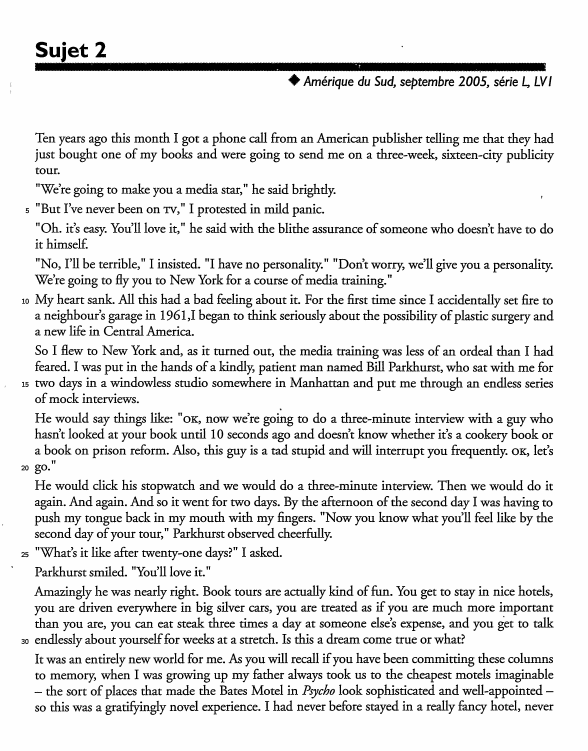Amérique du Sud, septembre 2005, série L, LV1: Bill Bryson, Notes from a Big Country, 1998, Black Swan édition, 1999.
Publié le 26/01/2021

Extrait du document
Ci-dessous un extrait traitant le sujet : Amérique du Sud, septembre 2005, série L, LV1: Bill Bryson, Notes from a Big Country, 1998, Black Swan édition, 1999.. Ce document contient 1203 mots soit 4 pages. Pour le télécharger en entier, envoyez-nous un de vos documents grâce à notre système gratuit d’échange de ressources numériques. Cette aide totalement rédigée en format PDF sera utile aux lycéens ou étudiants ayant un devoir à réaliser ou une leçon à approfondir en: Langues.
b) The passive used clearly indicates that the narrator was taken care of during the tour, that he had nothing to do or to take care of because everything had been planned and arranged for him. The publisher took charge of him. The only thing he had to do was to take part in interviews.
«
Sujet 2
♦ Amérique du Sud, septembre 2005, série L, LVI
Ten years ago this month I got a phone call from an American publisher telling me that they had
just bought one of my books and were going to send me on a three-week, sixteen-city publicity
tour.
"We're going to make you a media star," he said brightly.
s "But l've never been on TV, 11 I protested in mild panic.
"Oh.
it's easy.
You'll love it," he said with the blithe assurance of someone who doesn't have to do
it himself.
"No, 1'11 be terrible," I insisted.
"I have no personality." "Don't worry, we'II give you a personality.
We're going to Hy you to New York for a course of media training."
10 My heart sank.
Ali this had a bad feeling about it.
For the first rime since I accidentally set fire to
a neighbour's garage in 1961,1 began to think seriously about the possibility of plastic surgery and
a new life in Central America.
So I Hew to New York and, as it turned out, the media training was less of an ordeal than I had
feared.
I was put in the hands of a kindly, patient man named Bill Parkhurst, who sat with me for
1s two days in a windowless studio somewhere in Manhattan and put me through an endless series
of mock interviews.
He would say things like: "oK, now we're going to do a three-minute interview with a guy who
hasn't looked at your book until 10 seconds ago and doesn't know whether it's a cookery book or
a book on prison reform.
Also, this guy is a tad stupid and will interrupt you frequently.
OK, let's
20 go."
He would click his stopwatch and we would do a three-minute interview.
Then we would do it
again.
And again.
And so it went for two days.
By the afternoon of the second day I was having to
push my tongue back in my mouth with my fingers.
"Now you know what you'II feel like by the
second day of your tour," Parkhurst observed cheerfully.
25 "What's it like after twenty-one days?" I asked.
Parkhurst smiled.
"You'll love it."
Amazingly he was nearly right.
Book tours are actually kind of fun.
You get to stay in nice hotels,
you are driven everywhere in big silver cars, you are treated as if you are much more important
than you are, you can eat steak three rimes a day at someone else's expense, and you get to talk
30 endlessly about yourself for weeks at a stretch.
Is this a dream corne true or what?
lt was an entirely new world for me.
As you will recall if you have been committing these columns
to memory, when I was growing up my father always took us to the cheapest motels imaginable
-the sort of places that made the Bates Motel in Psycho look sophisticated and well-appointed -
so this was a gratifyingly novel experience.
I had never before stayed in a really fancy hotel, never.
»
↓↓↓ APERÇU DU DOCUMENT ↓↓↓
Liens utiles
- Amérique du Sud, septembre 2005, séries ES et S, LV1: Jonathan Coe, The Dwarves of Death, Penguin, 1990.
- Sujet national, juin 2006, série L, LV1: Adapted from Jonathan Keilerman, Twisted, 2005.
- Sujet national, septembre 2005, série L, LV1: Lê Thi Diem Thùy, The gangster we are ali looking for, 2004 .
- Sujet national, juin 2005, série L, LV1:Adapted from jeffrey Eugenides, Middlesex, 2002.
- Amérique du Sud, novembre 2005, L, LV1: Gabriel Garcia Marquez, Vivir para contarla, 2002.


